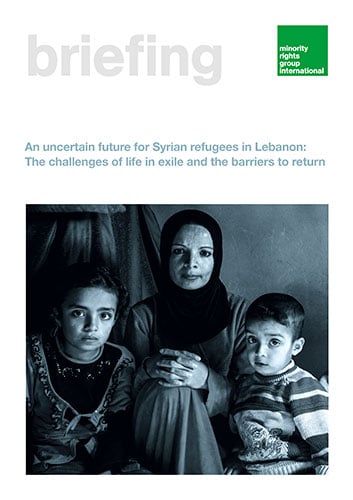
An uncertain future for Syrian refugees in Lebanon – New report highlights challenges of life in exile and barriers to return
Syrian refugees living in Lebanon are still caught in a precarious existence and in desperate need of stability, security and basic services, says a new briefing published by Minority Rights Group International (MRG).
An uncertain future for Syrian refugees in Lebanon: The challenges of life in exile and the barriers to return explores the situation of the Syrian refugee population in Lebanon today and the difficult choices that lie ahead of them, as well as the complex effects of their presence on Lebanese politics and the country’s delicate communal framework.
‘Lebanon has played a crucial role as a sanctuary for displaced Syrians escaping the horrors of conflict,’ says Carl Söderbergh, Director of Policy and Communications at MRG. ‘However, many Syrian refugees have continued to suffer and face human rights violations while taking refuge in the country.’
The briefing outlines how displaced Syrian refugees have suffered excessive use of force, limitations on freedom of movement and various other forms of discrimination and human rights violations, ranging from curfews to evictions. Lebanon has also on a number of occasions violated the internationally recognised principle of non-refoulement by pressuring Syrian refugees to leave the country through restrictive measures such as prolonged arbitrary detention or refusal of residency permits.
‘Though Lebanon has so far managed to avoid an outbreak of large-scale sectarian conflict, the most effective action to ensure the crisis in Syria does not spill over is for the Lebanese authorities to promote an inclusive and rights-based approach towards the refugee population,’ says Carl Söderbergh. ‘This would include prioritising the immediate humanitarian needs of the Syrian refugee population and providing a longer-term vision for the community to live with dignity and meaning within Lebanese society’.
Meanwhile in Syria, given the regime’s tight control of public expression and opposition, the likelihood of either a vibrant civil society movement or a progressive government approach towards the reintegration of returning refugees remains slim. Yet the long-term future of the country could depend on the extent to which, any process of return is undertaken freely and safely, with all possible measures in place to enable those displaced since the beginning of the conflict to return home.
Notes to editors:
- Download the report An uncertain future for Syrian refugees in Lebanon: The challenges of life in exile and the barriers to return here.
- See the Peoples under Threat index, which identifies countries around the world where communities face the greatest risk of genocide, mass killing or systematic violent repression.
- Minority Rights Group International is the leading international human rights organization working to secure the rights of ethnic, religious and linguistic minorities and indigenous peoples. We work with more than 150 partners in over 50 countries.
For more information contact MRG’s Press Office:
- Samrawit Gougsa, Communications Officer (London, UK)
E: [email protected] / Twitter: @MinorityRights